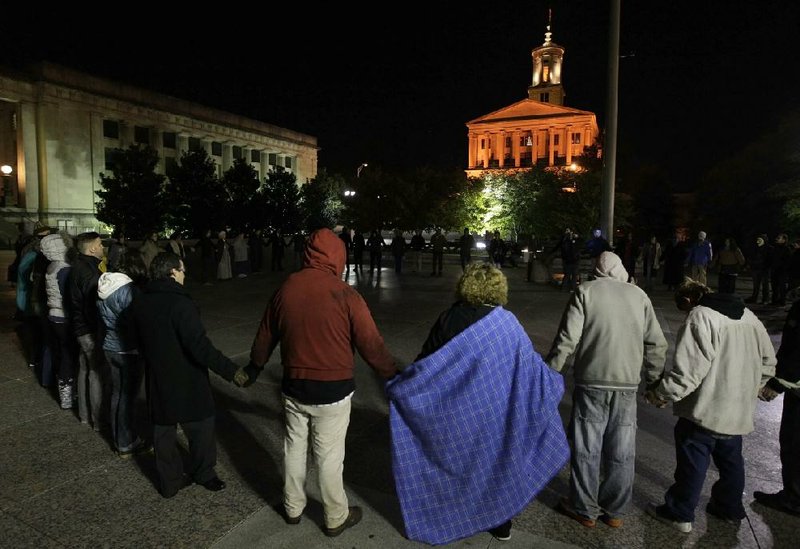NASHVILLE, Tenn. — Tennessee’s governor and his administration have twice sent state troopers to handcuff and haul away Occupy Nashville protesters camped out just steps away from the Capitol. And twice, a relatively obscure local official refused to throw them in jail.
In New York, Democratic Gov. Andrew Cuomo reportedly asked Albany’s mayor last weekend to begin enforcing the 11 p.m. curfew at a park where the protesters have set up camp. Mayor Jerry Jennings declined.
Demonstrators are camping out in public parks in cities across the country, protesting against what they see as corporate greed and inequities in the American economy. Cities are dealing with the situations differently, some trying to work with protesters to leave peacefully, while others have sent in police to arrest them.
Under Tennessee state law, a judicial commissioner determines if there is probable cause that a crime has been committed. That official in this case has set the demonstrators free, despite Republican Gov. Bill Haslam’s efforts.
The magistrate, Tom Nelson, has said state officials have no authority to set a curfew requiring the protesters to clear out or face arrest.
“The magistrate’s position is sort of a safety valve to prevent overzealous officers from putting people in jail for no reason,” Nashville attorney Jim Todd said. He said it’s extraordinarily rare when a magistrate refuses to sign off on an arrest warrant. But he supported Nelson’s decision, saying he believes the safety valve worked.
In Albany, Occupy protesters have set up tents in a city park across the street from the state Capitol. Cuomo has been targeted by the demonstrators for opposing an extension of a temporary tax on people earning more than $200,000 per year. And he wants them out.
Jennings said removing the group would be more trouble than it was worth.
“Some of the governor’s people were pretty firm about our not doing this, letting them stay in the park, but basically, we had allowed this before,” Jennings told the New York Post. “My counsel said we’d be opening ourselves up to civil liability if we forced them out.”
He added that he believed Albany’s left-leaning district attorney, David Soares, sympathized with the protesters.
“My understanding is he spoke to the Albany police and told them he wouldn’t prosecute,” Jennings told the newspaper.
In Nashville, a 10 p.m. curfew on the Legislative Plaza was instituted Thursday after protesters had already camped there for about three weeks.
For two nights, state troopers rounded up and handcuffed demonstrators, only to see them released.
The arrests may have backfired as protesters said they were galvanized by what they saw as an attack on their First Amendment right to assemble. New people showed up to protest. And even conservative bloggers who disagreed with the protesters’ goals of ending corporate personhood and removing money from politics were defending their right to demonstrate.
On Saturday night, protesters prepared for a third night of arrests but were greeted by only a single trooper on patrol who made no move against them.
On Sunday, a tent was back on the plaza and protesters said they intend to continue challenging the curfew, both by occupying the space and requesting an injunction in court.
Safety Department spokesman Jennifer Donnals would not say whether the troopers planned to continue the arrests, saying only, “The curfew remains in effect, and we urge the protesters to adhere to it.”
The ACLU of Tennessee said it planned to file a lawsuit challenging the curfew, a spokesman for the group told The Tennessean newspaper.
Elsewhere on Sunday, about 30 demonstrators were arrested in Portland, Ore., after they refused to leave a park after a midnight curfew, and a pair of pre-dawn confrontations between Austin, Texas, police and Occupy Austin protesters led to 38 arrests.
The first confrontation in Austin came about 12:30 a.m. Sunday when officers moved to enforce a new rule banning food tables in the City Hall plaza between 10 p.m. and 6 a.m. Some protesters surrounded the tables with arms linked.
Another incident came about 2 a.m., when more than 50 police officers moved to clear an amphitheater on the plaza for a regular powerwashing.
Most of those arrested were charged with criminal trespass, Austin Police Chief Art Acevedo said. No injuries were reported.
Information for this article was contributed by David B. Caruso of The Associated Press and by Kirk Johnson and Robbie Brown of The New York Times.
Front Section, Pages 3 on 10/31/2011



